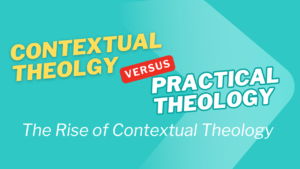Contextual Theology: Skills and Practices of Liberating Faith. Edited by Mika Vähäkangas and Sigurd Bergmann. Routledge, 2020. Book Review
This volume is a significant contribution to contemporary theological discourse. It particularly explores the relationship between contextual theology and liberation theology, which seeks to address marginalized communities’ specific needs and challenges. The editors structured the book into foundational concepts, case studies, and practical applications. Each chapter builds upon the previous one, offering a comprehensive understanding of contextual theology in theory and practice. The editors have curated contributions from diverse scholars and practitioners, ensuring a wide range of perspectives and experiences.
The opening chapter lays the groundwork by defining contextual theology and its importance. Vähäkangas and Bergmann emphasize one cannot understand theology in a vacuum. Rather, they argue individuals must engage with the cultural, social, and political contexts in which theology is practiced. The book then presents a series of case studies that illustrate the practical application of contextual theology in various settings. These studies are geographically diverse, spanning continents and cultures, thus underscoring the universal relevance of contextual theology.
One of the standout essays is Marlene de Beer’s chapter on South African liberation theology, which offers a poignant analysis of how faith communities have navigated the complexities of post-apartheid society. De Beer illustrates how contextual theology helped foster reconciliation and social justice, demonstrating its transformative potential. Another insightful study is Sigridur Gudmarsdottir’s chapter on the economic meltdown in Iceland in 2008 and its impact on the national identity. It explores the concept of “Outvasion Vikings,” which refers to the risk-seeking confidence of Icelandic financial tycoons who represented themselves as peaceful conquerors in the global market and, in doing so, discusses the importance of contextual theology and poststructuralist perspectives in understanding and interpreting the meltdown. Similarly, an insightful case study by Atola Longkumer focuses on the socio-economic challenges faced by India. The chapter highlights the contradictions and inequalities present in the country despite its economic growth. It emphasizes the marginalization and discrimination faced by vulnerable communities such as Dalits, Adivasis, and women and the need for contextual theologies to critique and challenge social hierarchies. It proposes a critical re-imagination of liberation theology in India in order to address economic inequalities, oppression, and social justice.
Another highlight is the chapter by Teresa Callewaert, which focuses on reclaiming religious tradition (i.e., beliefs, practices, customs, and values that are passed down from generation to generation within a particular community or culture) and using it to develop a genuinely liberating theology. In doing so, she focuses on Gustavo Gutiérrez’s and Ali Shariati’s perspectives. Both theologians argue that theology can create an awareness of oppression and mobilize people for the struggle. Callewaert argues that religious tradition can help in this process. Another notable contribution comes from Volker Küster, who delves into contextualization in theology and its practical implementation in Christian art in Africa, Asia, and Latin America. In so doing, the chapter explores the typology and methodology of contextual theology, emphasizing the hermeneutical circle between text and context. The chapter provides examples of contextual Christian art and its theological significance, showcasing how artists respond to the signs of the times and contribute to a deeper understanding of faith through visual representation.
While Contextual Theology: Skills and Practices of Liberating Faith is a comprehensive and insightful volume, it has challenges. One of the primary criticisms is that the book could benefit from a more explicit engagement with the critiques of contextual theology. A more robust discussion of these critiques would have enriched the volume. Additionally, the book’s emphasis on practical applications sometimes comes at the expense of deeper theoretical exploration. Some readers may want a more in-depth analysis of the theological concepts underpinning the case studies and valuable guides. Despite these criticisms, the editors have created a volume that is both accessible and academically rigorous, making it a valuable resource for scholars, students, and practitioners alike. Overall, Vähäkangas and Bergmann have created an intellectually stimulating and practically helpful volume by bringing together diverse voices and perspectives. The book’s emphasis on the liberating potential of faith, particularly in contexts of oppression and marginalization, is a timely reminder of the transformative power of theology.
You can buy the book here:






